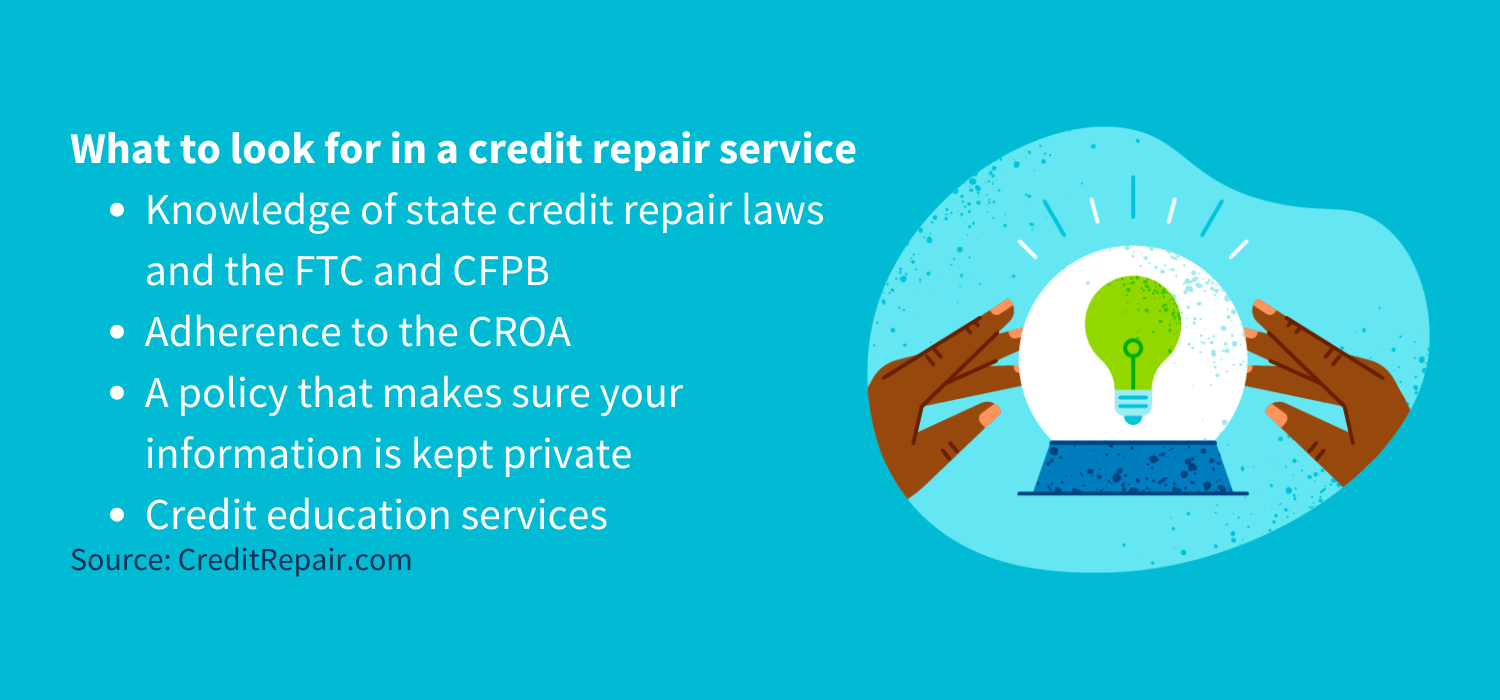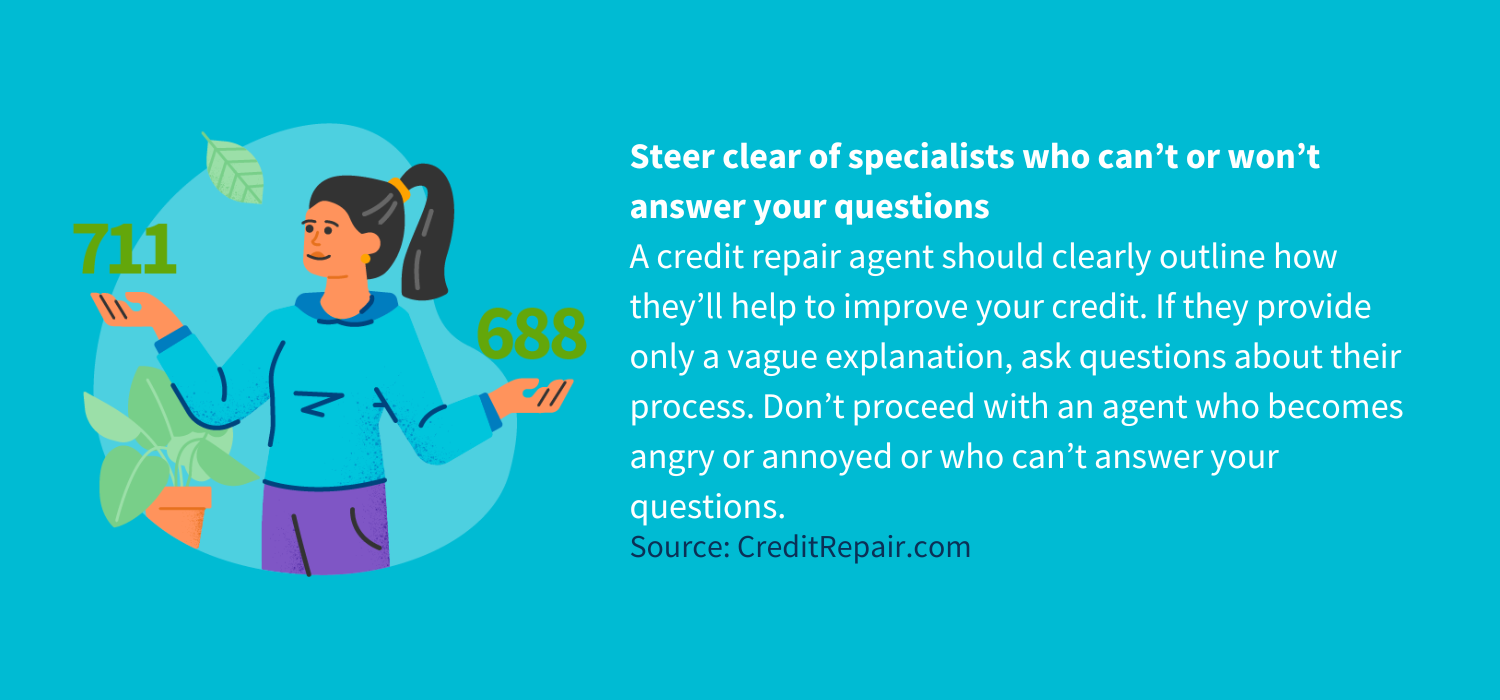
Disclosure regarding our editorial content standards.
If you’re interested in credit repair services, you need to be able to identify who might be more or less trustworthy to work with. Credit repair specialists can be a significant asset, but not all credit repair specialists are created equal. Keep reading for a complete breakdown of what a credit repair specialist does and the regulations they must abide by.
What does a credit repair specialist do?
A credit repair specialist or agent helps people work to improve their credit. They assist people with ensuring they have the most accurate credit report possible.. In addition, their services can be beneficial for those with large amounts of debt, histories of late payments and other negative credit information on their credit reports. Individuals who were victims of identity theft may also enlist the services of credit repair specialists.
When you hire a credit repair specialist, they’ll first ask questions to become familiar with your personal and financial history and get a feel for how you’ve used credit in the past. Once they gather background information, the specialist will examine your credit reports from the three main credit reporting bureaus. In some cases, they may ask you to obtain the reports yourself. Other times, specialists will use software to pull the reports on your behalf.
After obtaining a credit report, the credit repair agent reviews the reports. They look for negative information, such as late payments, charge-offs and defaults, high credit usage and lines of credit. Then, they review this information with you to make sure what the credit reporting bureaus show is accurate. If there are inaccuracies, the credit repair specialist can assist you with filing disputes to have the information corrected or removed.
The primary job of a credit repair specialist is to help people obtain a fair and accurate credit report so they can improve their credit and financial health.
Credit repair specialists also serve as educators. They teach clients how to avoid getting back into debt in the future by establishing a budget and using credit wisely.
How credit repair specialists can help you
A credit repair specialist will work with you and do what they can to improve your credit. The first step in the process is together, review all your credit reports and look for inaccurate or misleading info that could be challenged. Under the Fair Credit Reporting Act (FCRA), all consumers have a right to a fair, accurate and substantiated report. If you find something you want to challenge, the credit bureaus will examine your proposed dispute and may move forward with an investigation.
Once you and your credit specialist find an inaccurate or misleading item on your credit report, the next step is to prepare a challenge letter (also known as a dispute letter). Either the consumer or the credit repair specialist will send the dispute letter to the credit bureaus and debt collection agencies in the hopes of opening an investigation.
Examples of common credit report errors include accounts that don’t belong to you, accounts listed multiple times and inaccurate account amounts, payments details or dates.
Unfortunately, dealing with the credit bureaus to handle mistakes on your credit report can sometimes be challenging. Some people choose to try to go around the credit bureau and communicate directly with the creditor. Ultimately, anything listed on your credit report was supplied by a creditor, so they’re the source of the inaccurate data.
You can try to send a goodwill letter to a creditor or financial institution asking that they remove inaccurate data from your credit report. This action is known as a goodwill adjustment and will require the creditor to reach out to the bureaus to fix the mistake.
Note that while the credit bureaus legally have to—at the least—review your dispute request, the same is not true for a creditor. They may receive your goodwill letter and choose to ignore it.
Sometimes consumers will come in for credit repair services but all the information on their credit report is accurate. While this means filing a dispute letter isn’t an option, there are other approaches available. A pay for delete letter is an offer to pay a debt in its entirety if the creditor removes it from your credit report. If your creditor is open to this arrangement, make sure to get everything in writing.
After your credit is repaired, it’s crucial to stay on top of your credit. Negative items on your credit report are most easily addressed when they’re new and haven’t had months (or years) to drag your credit score down. All consumers have the right to free credit reports from each of the three major credit bureaus (Equifax, Experian and TransUnion). Make sure to take advantage of this and review your information annually for mistakes.
What certifications are credit repair specialists supposed to get?
Credit repair specialists must follow the rules outlined in the Credit Repair Organizations Act. It forbids agencies from using deceptive marketing practices and charging excessive fees. However, it doesn’t mandate that specialists receive any type of license or certification.
A credit repair agent may choose to get voluntary certification to demonstrate their knowledge and skills and give their clients peace of mind. The Credit Consultants Association (CCA) and the Association for Financial Counseling & Planning Education (AFCPE) are the two main certifying bodies for credit repair specialists.
Who can be a credit repair specialist?
Technically, anyone can say they’re a credit repair specialist and offer their services because there aren’t any industry certifications you’re required to get. Unfortunately, this can result in unqualified people trying to pass themselves off as specialists. Fixing your credit is a serious situation, and you should only work with a professional who knows what they’re doing.
There are certain rules and regulations that have to be followed by any credit repair organization. It’s important that you understand these regulations so you can protect yourself. If you start working with a credit repair specialist and notice they seem to be breaking the industry rules and regulations, it’s a red flag, and you should stop working with them.
What laws do credit repair specialists have to follow?
Credit repair specialists have to follow the Credit Repair Organizations Act (CROA). The CROA was created to protect consumers, and it states that credit repair companies (and their employees) can’t lie about their services or the results. Some of the most important rules are that credit repair companies cannot:
What is the difference between independent and non-independent credit repair specialists?
As you consider potential credit repair specialists, you may encounter both independent and non-independent professionals. An independent credit repair agent is self-employed. They seek out clients themselves and do all the credit repair work on their own. If you’re hiring an independent credit repair specialist, the person’s education and experience are important considerations.
Non-independent credit repair specialists work for an entity, such as a for-profit or nonprofit credit repair company. In some cases, the credit repair agent you speak to isn’t the same person who handles negotiations with creditors and reviews your credit report. As a result, it’s important to vet the entire company, not just the individual specialist.
What to look for in a credit repair service

Whether it’s an individual or a larger company, you should look for these things:
Knowledge of state credit repair laws and the FTC and CFPB: Each state has specific credit repair laws. You want to work with someone who knows and is abiding by the state laws. Research these laws beforehand and ask your potential credit repair specialist about the rules to test their knowledge.
Adherence to the CROA: Under the CROA, a credit repair organization always has to give you a written contract and explain your rights before taking you on as a client. If your credit repair specialist fails to do this, they might ignore other parts of the CROA, which can put you at risk.
A policy that makes sure your information is kept private: The written contract mentioned above should include a policy that details how your data is shared and used. Some credit repair companies may try to sell your information to interested parties to make more money off you. Read the privacy policy carefully and make sure it aligns with your preferences. Ideally, the company shouldn’t share your data with anyone other than the bureaus and financial institutions directly associated with your disputes.
Credit education services: Often, credit repair specialists also offer credit education services. This isn’t a necessity, but it’s a nice bonus. This type of education can help make sure you don’t end up in a situation where you need to fix your credit again. Credit repair education will teach you the five credit factors that apply to your score, how you can improve your credit even more and common credit mistakes to avoid.
How to keep yourself safe when working with a credit repair agent
There are many reputable credit repair specialists who are eager to help people obtain an accurate credit report. Unfortunately, not all credit repair agents are ethical and trustworthy.
To protect yourself from scams and fraud, follow these tips.
Be wary of offers that sound too good to be true
No credit repair specialist can guarantee they’ll be able to remove all negative credit information from your report or fix your credit completely in a few days or a week. Credit repair specialists also can’t know for sure how many points they’ll be able to improve your credit score. If a credit repair company makes big promises and offers specific guarantees, proceed with caution.
Do some background research
Before hiring a credit reporting specialist, do an internet search for the individual’s name and their company’s name, if applicable. Read reviews and testimonials published online. Check for any news stories about the company. If you don’t find any information at all, proceed with caution. In many cases, scammers will set up a credit repair business, defraud people and then change the name of their operation to avoid getting caught.
Don’t apply for an Employer Identification Number or use a Credit Privacy Number
One common scam is to have unsuspecting clients apply for an Employer Identification Number (EIN) to get what fraudsters may refer to as a “new,” “refreshed” or “secondary” credit file. This does nothing to fix the client’s original credit report and could put them on the hook for committing fraud, as EINs are meant for businesses.
Another version of the scam is to assign the client a credit privacy number (CPN) and encourage them to use it when applying for credit. This is essentially a fake Social Security number. Again, this won’t improve your credit. In some cases, the CPN may actually be the Social Security number of a person who was the victim of a data breach or identity theft.

Steer clear of specialists who can’t or won’t answer your questions
A credit repair agent should clearly outline how they’ll help to improve your credit. If they provide only a vague explanation, ask questions about their process. Don’t proceed with an agent who becomes angry or annoyed or who can’t answer your questions.
Ask for a complete list of fees and costs
Credit repair agencies and individual specialists who provide legitimate services should have a schedule of fees available for you to review. Never hire a professional or company that won’t disclose the costs to you.
Never file inaccurate disputes
Disputing inaccurate information is a normal part of the credit repair process, but filing a dispute over accurate detail is not. Some scammers will instruct clients to dispute every item in hopes of overwhelming the credit bureaus. This is unlikely to work as intended and involves you in fraud.
If you’re looking for help fixing your credit, a credit repair specialist is a good lifeline. However, you must be careful when conducting your research so you can work with a qualified company. CreditRepair.com empowers every individual to get the credit they deserve. Get started today.
Note: The information provided on CreditRepair.com does not, and is not intended to, act as legal, financial or credit advice; instead, it is for general informational purposes only.
Questions about credit repair?
Chat with an expert: 1-800-255-0263






